#character itself or the future of the characters
Text

"If you don't romance characters in Dragon Age: The Veilguard, they'll find other partners for themselves
"Some characters may be a little more steamy..."
---
"Dragon Age: The Veilguard features a far more fleshed out romance and relationship system than in previous BioWare games, the developer has told Eurogamer - including the ability for party members to go off and find their own love interests, should you not be interested yourself.
Speaking to Eurogamer's deputy editor Chris Tapsell at an event in LA this week, The Veilguard's creative director John Epler revealed more of the game's relationship system.
"In Dragon Age games, BioWare games, romance is a core part," Epler said. "We wanted to give each character their own flavour, or their own style, of romance. So some characters may be a little more steamy while some characters maybe a little bit more innocent. But for each one, you can build these relationships.
"And what's interesting in this game is, if you don't romance characters, they may decide to find their own romances for themselves, whether within the team or within the world itself."
It's reminiscent somewhat of how Shepard could walk in on Garrus and Tali locked in a kiss towards the end of Mass Effect 3 - but only if you had chosen not to show romantic interest in either one beforehand.
What sounds like another improvement from previous BioWare games is how a character's romance arc will be better woven into their own personal story arc, and their involvement with The Veilguard's core questline. BioWare has also worked to ensure that getting to know your characters as friends feels just as satisfying - and that just because you're not banging your buddy, their (platonic) relationship with you will still continue.
"One of the things we tried to do with The Veilguard is it's not just romantic relationship building," Epler continued. "You need to get to know a person before you can really build that kind of relationship with them, and if you choose not to build a [romantic] relationship, we never want to feel like you're being cut off. There's no 'okay, well, their arc isn't progressing, I'm done'.
"We want to make sure the non-romantic relationships are deep as well, with friendships not just for companions and yourself, but also between companions across the party."
For much more on Dragon Age: The Veilguard, be sure to read Eurogamer's full preview of the game's opening hour, as well as much more from Epler on lessons learned for BioWare's present - and future."
[source]
#dragon age: the veilguard#dragon age: dreadwolf#dragon age 4#the dread wolf rises#da4#dragon age#bioware#video games
632 notes
·
View notes
Text
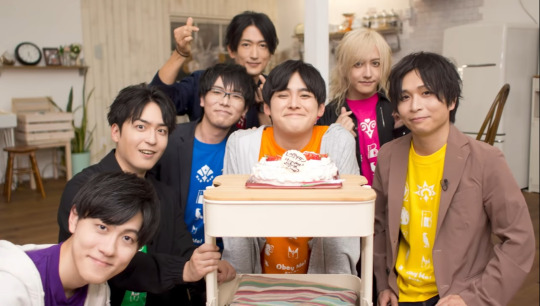
i miss otaku fm with all my heart and soul and i've been patiently waiting for satoshi kada (leviathan's va) to get back into the studio, and interview everyone all over again. i miss the live drama recordings, the stupidly funny plots, the realistic slip-ups and quirks from each of the cast members. i miss a toast in hell's kitchen and genuinely learning and listening about the talents behind the game, and people's amiable messages and questions towards them in Tell Me!
honestly i'm on my knees begging for a third season where maybe he interviews the vas for thirteen, mephisto and raphael since i haven't seen/heard much from them too in terms of personal messages to fans.
satoshi kada, with his radio, acting and tv experience is such a sweet and soothing personality who brings such warmth to every single project he works on, including obey me. i just wish solmare really really recognized how impactful these podcasts were, no matter long or short, and the abilities of this main cast because goddamit..in such a time where nightbringer is being scrutinized and obey me itself is falling in popularity, absolutely none of the voice actors have forgotten or even brushed aside obey me.
"oh it's because they're working for the game, they'd get fired if they criticized it"
//NB: ik this video is sort of old but i have plenty more proof that the vas still play the game, I thought this was just the best example.//
fuck, most (if not ALL) of the vas play the game??? they get the exact same experience as you and i!! and every boys in the house clip i see them happy to be there together, praising and celebrating the game and just having fun man. it's honestly so touching.
i miss the anime episodes: the ideas shared between the vas and the writers, and every episode seven with the va's analysing their performances and characters makes me laugh till my stomach hurts. you *should* consider how entertaining the anime is; it's obviously rather low budget but you can really tell ( even though this wasn't the obey me universe we know and love) it still kept people on their feet and entertained me like some twisted ao3 crackfic istg. you can tell that the anime was made with fans in mind, and that's where the writers for it really flourished. to this day I still see people talking and sharing screenshots from it..
basically.. let's try not focus on the fact that "obey me is getting worse", let's all look to a future and try and be positive about things, yeah? because behind this silly little demon dating sim are talented writers, artists, coders, ambassadors and fans that have kept the game alive for 5+ years.
i wish obm does flourish more in the future, and the devs focus on creating a game(s) and content that inspire, enlighten and make everyone smile.
please, as a ty, take my silly photos of my favs. I must spread the word..





#this is so CRINGE#ewww youre a solmare dickrider NO IM A SEIYUU DICKRIDER GET IT RIGHT!!! /hj#and i'm NOT saying that you shouldn't criticize solmare or anything#cause giving a game criticism bcs you want to see it flourish is TOTALLY understandable and i encourage it to the highest of degrees!!#tags tags tags this place is meant for tags not FOOTNOTES you gaybo#obey me#obey me shall we date#obey me nightbringer#obey me!#obey me boys#obey me leviathan#obey me lucifer#obey me mammon#obey me satan#obey me asmodeus#obey me beelzebub#obey me belphie#obey me belphegor#satoshi kada#kada satoshi#kazuya yamashita#yamashita kazuya#sumi shinya#onishi satoshi#kyohei yaguchi#yaguchi kyohei#miura ayme#shinya sumi#ayme miura#va rambles by cam
112 notes
·
View notes
Text
TWST - fragrances!

Disclaimer: I have not personally smelled most of these perfumes; I chose them based on their notes.
Just because a brand has been added it does not mean I support it or align with their values; I am focusing on the products on their own. The majority of these perfumes are quite expensive anyways - if you like any, I suggest directly looking for a dupe.
I picked these with the characters' preferences in mind rather than trying to encapsulate their scent/vibe. My explanations are added to each one!
Due to the photo limit, only the main cast are present. I will make a future post with others :)
As usual, I ask you to not repost any of the photos/the post itself outside of Tumblr or within it.
My main sources have been Fragrantica and Wikiparfum (some images used are from their website), along with the brands' sites.
The notes are mainly sorted from top (the ones you smell first) to bottom (the ones that linger last), though I have been unable to verify some's placements, thus they are presented in what I assume would be their order.
HEARTSLABYUL


Notes: pink pepper, blackcurrant sorbet, pink rose, peony, salty vanilla, patchouli, cashmere wood
I wanted Riddle's liking for sweets to be present, though not overwhelmingly, so opting for a floral scent was a better way to show it. I would have searched for an aldehyde-having perfume, but I feel like he already has that clean laundry smell from his clothes.

Notes: orange, elemi, star anise, lavandin, clary sage, petitgrain, fir balsam, cypress, pine needles
I imagine Trey spends enough time surrounded by sweet gourmands to want something softer, though even if he hadn't been a baker, he still gives the vibe of enjoying herbals.
I had also chosen Velvet Cypress, which matched beautifully with its greenness, but the scent profile wasn't my first bet... :(
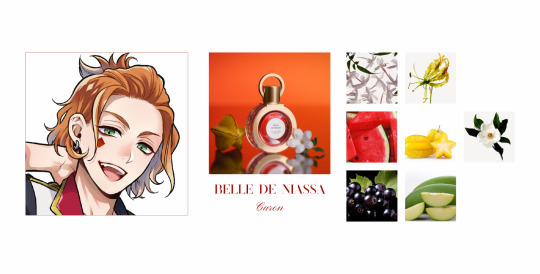
Notes: jasmine (and sambac), ylang-ylang, watermelon, carambola, magnolia, blackcurrant, green mango
My mind immediately went to fruity sweetness when it comes to Cater, though a toned down version with the involvement of florals. He'd want to match his bubbly image while not overwhelming his senses, right?

Notes: citrus, amber, cedarwood, tonka bean, vanilla, sandalwood
Now, the fact that one of the most popular perfumes matches what I had in mind for Ace is genuinely coincidental. I do see him buying this as a treat for himself though, regardless of it being trendy.
While he is pretty masculine, there is a freshness still present that would reflect in his perfume - he still lacks the maturity and taste of a man.

Notes: Sicilian bergamot, mandarin, green apple, cashmere wood, cedarwood, petitgrain, violet, pomarose (not pictured), oakmoss, musk, amberwood (not pictured)
In contrast to Ace, I picture Deuce to enjoy fresher and sweeter scents, which is how this perfume made the cut. He seems more open to wear less traditionally masculine fragrances.
SAVANACLAW


Notes: rosemary, sage, black pepper, star anise, plum, birch tar, cumin, Bulgarian rose, myrrh, tobacco, suede accord, leather accord, honey, oud, praline, frankincense
Leona is what Ace still lacks, though more wild and carefree in comparison to an older man. I definitely see him using perfumes with leathery smells rather than herbals or fruits, unless they're toned down; a big part of it is his sensitive nose of course.
Under the roughness, there is a sweetness to be found.

Notes: salt, timur pepper, ginger, bergamot, black iris, saffron flower, violet leaf, blue cypress, suede, oud, mastic absolute, tobacco leaf
Considering Leona's hand-me-downs to Ruggie, I feel like he would have included a perfume from his younger years too. The profile is similar to the current one, yet lighter thanks to the inclusion of more florals. I think it also matches Ruggie, having some parallelisms to Leona yet toned down.

Notes: amaretto, leather, wood, patchouli, musk
Despite maintaining the leathery vibe, Jack strikes me as if he would enjoy sweetness, though in the form of flowers. This perfume only really has patchouli as a plant, but the amaretto, musk and wood make up for it with a deeper & warm sweetness.
OCTAVINELLE

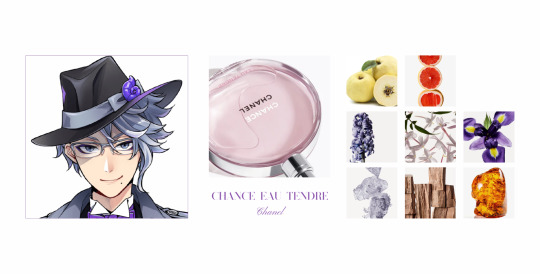
Notes: quince, grapefruit, hyacinth, jasmine, iris, musk, cedarwood, amber
Azul is a synonym for powdery and light florals to me. I do see him using more classically masculine fragrances as well, though still a softer version.
I had originally assigned him Jersey (Chanel) because of the lavender, but this one fit better.

Notes: pear, lily of the valley, aldehydes, iris, rose absolute, orange blossom, patchouli oil, ambrette seeds, white musk
I think we can all agree Jade is the president of aldehydes; the cleanest linens you will ever experience. He'd incorporate florals too, especially those he finds during hikes - a deceiving softness.

Notes: mandarin, sea water, Egyptian geranium, clary sage, lavender, rosemary, oak moss, patchouli, vetiver, vanilla orchid
People have said this smells like the holidays, which couldn't be more fitting. Floyd has the freshness of a fruity perfume without really having it in its profile (there is a citric note of course). He would also use less conventional scents, such as sea water.
SCARABIA


Notes (most I have confirmed, but beware that some I'm doubtful on): bergamot, red berries, blackcurrant, florals, mandarin, honey, caramel, almond, patchouli, sandalwood, vanilla, chocolate
I feel like Kalim is a gourmand person; he'd go for the caramels, vanillas, coconuts...I actually wanted to find a perfume with coconut and flowers for him, but I settled on this one since it also fits.

Notes (not 100% verified): mate, pink pepper, violet leaf, clary sage, patchouli, bergamot
Albeit simple, Jamil's perfume is definitely a nice one. His choices would be influenced by aromatherapy; he'd definitely wear calming scents. A lot of herbals, but there are some richer fragrances in his collection for special occasions, like ambers.
POMEFIORE


Notes: jasmine (sambac), orange, bergamot, mandarin, gardenia, orange blossom, sandalwood, white amber, cedarwood, white musk
As soon as I got to Vil while brainstorming, I knew one of the Poison perfumes had to be in his hands. He definitely combines the softness of florals with the sharpness of citrics and the richness of ambers. His fragrances are a luxurious dessert that leaves you wishing for more.

Notes: thyme, tea, lily of the valley, saffron, rose, suede, musk, sandalwood, olibanum, amber
Based on the description we got, I wanted Rook to have a perfume with amber and musk, though with other notes too. Originally I thought of Jo Malone's Midnight Musk & Amber, but since it is discontinued, this one took its place. I find the scent profile to match Rook better; he'd want something herbal to soften the warm richness.

Notes: aldehydes, rose centifolia, peony, violet, musk, sandalwood
If I may be honest, I first assigned this to Vil (I know, the name), but since I wanted him to have a Poison perfume and eventually found a better scent profile, this one seemed more fitting for Epel. It's especially fitting post-VDC once he starts embracing his femininity, yet with the deepness of musk and sandalwood highlighting his strength.
IGNIHYDE

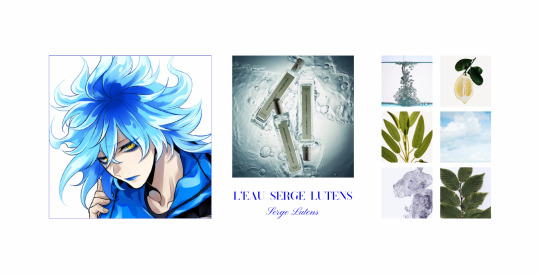
Notes: aldehydes, citric, clary sage, ozonic notes, musk, ironwood (hornbeam)
Originally I imagined Idia would reach for a more metallic scent, though I couldn't find any I particularly liked (I don't even know what metal perfume smells like...), so I opted for my first thought: aldehydes and citrics. While Idia does enjoy his candies, I feel he'd want a very simple scent profile, and this perfume was perfect.
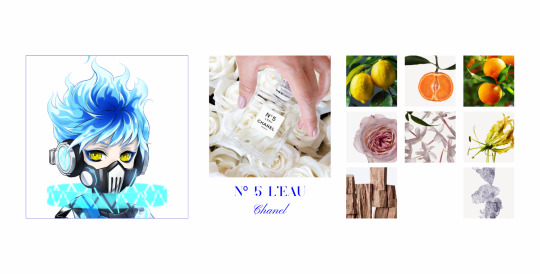
Notes: lemon, mandarin, orange, rose, jasmine, ylang-ylang, cedarwood, musk
Like Idia, Ortho to me would reach for aldehydes (which this perfume has) and citrics, though his fragrances would be sweeter. I imagine he'd mask the metallic smell with it.
DIASOMNIA


Notes: Italian lemon and mandarin, mint oil, candied apple, geranium flower, clary sage, ambermax, cedarwood, vetiver, patchouli, sandalwood, vanilla
While still very masculine, I feel Malleus' choices would have a sweetness to them, wanting to lure you in with a sense of safety.
I smelled this perfume years ago and still remember how much I loved it; it truly is fitting to him.

Notes: wild berries, blackcurrant buds, musk, blackberries
Immediately, my mind went to berries. Lilia would heighten his cute image through sweet scents, especially fruits, though he could reach for gourmands.

Notes: fig milk, mandarin, sandalwood, violet, tonka bean, musk
Silver is on the natural side; he'd reach out for florals and herbals instead of overwhelming scents. Though he reminds me of clean linens too, in a warmer way - like the creaminess of a lactonic without them. It comes through thanks to the notes in this perfume.

Notes: lavender, rosemary, petitgrain, clary sage, geranium, ambery wood
Out of everyone in the Diasomnia quartet, Sebek feels like the one that embraces masculinity most, especially its sharpness. Though because of his age, it still has a softness present through floral hints.
A relative of mine has owned this perfume, and it's a rather nice scent. I definitely see Sebek wearing it to strengthen his appearance.
#My poor laptop#I have stared at so many ingredients#I'm very thankful I didn't have to actually smell them#I'd be mentally gone if that were the case#riddle rosehearts#trey clover#cater diamond#ace trappola#deuce spade#leona kingscholar#ruggie bucchi#jack howl#azul ashengrotto#jade leech#floyd leech#kalim al asim#jamil viper#vil schoenheit#rook hunt#epel felmier#idia shroud#ortho shroud#malleus draconia#lilia vanrouge#twst silver#sebek zigvolt#twisted wonderland#twst
137 notes
·
View notes
Text
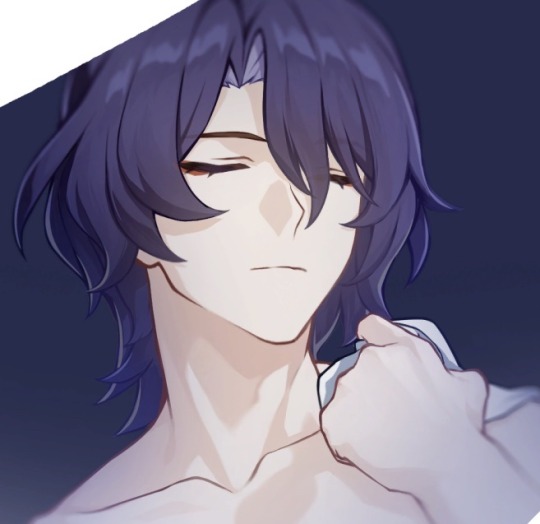
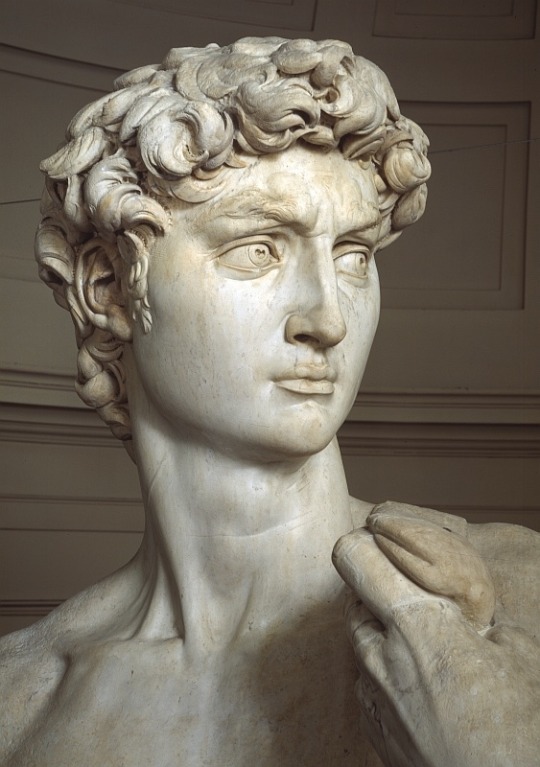
I wanted to share some wee thoughts about Ratio’s E6 art & why I believe it is a symbolic parallel to Michelangelo’s David. This speaks to both Ratio’s humanist beliefs and possible future plot points.
Ratio’s E6 is Vincit Omnia Veritas or Truth Conquers All. I’ve heard it claimed (although I have no idea if it’s explicitly stated anywhere?) that the character’s E6 art represents them at their innermost core, an honest and deeply vulnerable shard of themselves. Evoking David here is an interesting choice; the biblical figure who, using nothing but a stone and sling, took down the tyrannical Goliath. The parallel is perhaps as simple as this: Ratio views himself - and by extension the truth - as the underdog, someone never accepted into the Genius society, forever to be kept from Nous and THEIR gaze, but nonetheless will, in the end, prove himself the final victor. Truth will topple the seemingly unconquerable, whatever that might be.
But I also think Michelangelo’s David is a specifically interesting parallel to draw on from a historical perspective. Ratio is pretty much the textbook definition of a renaissance man - he is a philosopher, a scholar, interested in medicine and science and the vast array of human achievement. He speaks in Latin (the language of education during the renaissance in Europe that allowed the transmission of information without having to rely on translation) while heavily styling himself on Ancient Greek symbols and drawing from Greek philosophy (often seen at the time as more ‘sophisticated’ and interested in ‘wisdom’ than the contemporary ‘militaristic’ Romans).
Michelangelo’s David was the first colossal marble statue to be carved since antiquity, and it came to be a symbol of the renaissance itself. This is interesting to me for Ratio and what I believe are his humanist beliefs. Humanism was an ideal that propagated during the renaissance that championed the belief that man had beauty, dignity and worth that deserved as much respect and adoration as any deity. Keep in mind this philosophy was emerging following the Middle Ages and at a time where religious institutions across Europe held exorbitant and sometimes absolute power. David as a statue is an ode to the sublime beauty of the human body, completely unashamed and uninhibited in his gigantic nakedness (Doctor! You’re huge!) retaliating against the idea that prominent idea at the time that man’s body is inherently sinful. The humanists sought to recenter humanity, and David became a symbol of man’s independence against the seemingly unconquerable might of the Church.
Consider how Ratio centres humanity in his Simulated Universe project, how he values every life, how interested he is in constant self-improvement. How this symbol - of not just the renaissance but of the re-centring of humanity itself - becomes an echo of an effigy fixed in the centre of his soul.
Ratio has never - as far as I’m aware? - stated or hinted at any desire to overthrow the Aeons or even disparage or rubbish them, but it is clear to me that he believes in the strength man can draw on despite them, through sheer force of intelligence and clever planning and fiercely independent thought, the weak can ultimately overcome, or at least stand shoulder to shoulder with, the strong. Perhaps this will become a more pertinent plot point in the future - who knows? - but this was fun to chew through nonetheless 🫶
#ratio#dr ratio#HSR#my witterings#Honkai star rail#important to note that the humanists weren’t necessarily purely secular#some Christian humanists see David as a sublime symbol of man in gods image#but I thought this was interesting anyway#meant this to be a short thing but then rambled on OOPS#gets me thinkin tho abojt Rat being so Huge during 2.1#all his statue imagery and stuff too#just like the actual statue of David is fuckinnnn massive#which is mad right cause he was meant to be a smallie#but again it’s putting the focus on the strength and indomitable size of the human spirit right?#blabbity blah I love Ratio lol I hope they keep playing with him in future patches hhhh#I also really don’t want to come off like one of those statue pfp retvn fashy people#nor do I mean to romantacise any of the figures / movements I talk about#just playing in the sandbox here with my toys lol
59 notes
·
View notes
Text
As a dissociative system who spent most of our life into our 20s splitting without realizing it, convinced we were endogenic soulbonds for all of that... you would think I'd be bitter about endos! But it is in fact free, $0, to not project my problems onto them. The world and my brain are confusing, and I was biased against a medical perspective long before meeting other systems.
It smacks of personal responsibility in a way I think a lot of people wrapped up in this discourse do not wanna acknowledge. What other people do - online, not in your real life / against your will to remove yourself from - is not your circus. And that goes both ways. I have fictional characters in my head and so does an endogenic follower; our similarities are complicated and don't always align, but at the end of the day they had Nothing to do with my upbringing, medical issues, and (ongoing!) identity crisis. No corny pride flags or "the future is plural" slogans or magic spells had a single effect on me that I ultimately didn't have control over.
If I read something I didn't like, or met a system that confused me, I could simply ignore them. That's how the internet works. What you see is your own responsibility. How you react to what you see is likewise your own responsibility. Having this disorder doesn't give us a pass to make it the problem of strangers. They have fuck all to do with it. Like, clinically.
It's our problem, not anyone else's! Deal with it! This is the message of tough love that you need but may not want. You and your system are responsible for itself. Internet beefing with endos until the end of time is pathetic. Your priorities are about clout, not wellness.
Full offense, but at some point you gotta grow up and stop blaming other people for your problems. Non-disordered systems, systems with mixed or unknown origins, whatever the heck is trendy to hate on, you've gotta let it go. Things in our life messed us up and made us weird, great, now cope with it. It's no one else's job to hold your hand while you explore the internet and come into contact with people you disagree with. Be upset, be creeped out, disbelieve them, be against anything you want, but it's your problem. No one else is guilty, you just can't handle it.
26 notes
·
View notes
Text
ding ding ding! After more than one month in the making, I'm finally dropping the fourth character sheet upon you, plus a little announcement! My scanner isn't really the best and I hope Tumblr doesn't butcher the quality of the illustration, but I'll put a photo of it at the end just in case
After this one, I'll start focusing on making "longer" versions of the existing character sheets through the Atlas expansion of Notion. So we can consider these Tumblr posts as "short versions" for now!
More on that soon hopefully
---------------------------
Your commitment... is misdirected. Your efforts, misplaced.
-Tristam, Ch.7

Tristam Cavalieri
Gender: Male
Pronouns: he/him
Age (at Ch.1): 15
Nationality: Italian
Height/Weight: approx. 160 cm/49 kg
Flame type: Pallid Flame
Affiliation: Cavalieri Family (Mother Branch, heir)
Birthrates among the Cavalieri family are extremely low, and even lower when it comes to biological males. One would say it’s a curse, but it is in fact a blessing: children born male among the Cavalieri are destined to either a destined death, or oblivion.
If born without the Pallid Flame, they’re considered useless, a waste of flesh, and are normally relegated to low-level jobs among the family. If born with flame, their bodies are doomed to give out early in life, some not even making it to see their adult days. This “event” - because defining it desease would be underestimating it - is called the “Chiamata alle Armi” (Call to Arms).
But the coming of Tristam was truly a miracle. Born with the Pallid Flame and without the gene that causes the Call to Arms, he’s been treated like a gift from heaven itself ever since early age, a ruler fated to bring new life and glory to the Cavalieri Family. The result of his upbringing is a proud, gracious, and seemingly courteous boy who’s been his mother’s most faithful follower and apprentice.
He takes his role very seriously. The young lord has been gathering consensus quickly, and has made strong allies among the family throughout his teenage years. Before him, there's only one documented case of a male-born Cavalieri who possessed the flame and yet lived to old age - the Cavalieri Fifth, Bonfante.
His future is bright, he knows it. And nobody doubts it.
------------------------------------------------
Please feel free to hit me up through asks, DMs or Discord with any kind of questions, feedback or general thoughts on Killer Whale you might want to bring to my attention! Answering questions (while avoiding spoilers) is of immense help to me to develop my OCs more efficiently, so for anything, I'm all ears!
Previous character sheet: Anemone
Preliminary Info on Killer Whale: update post
My Ao3 account: myelltheorca
photo versions:


#khr#katekyo hitman reborn#khr oc#reborn#khr killer whale#khr fanfic#tristam killer whale#character sheet#I just could not wait to get him out of my desk#deciding his colour palette was hellish#his clothing also made me scream#but I'm honestly super proud of it#I should have included more expressions of his but I'm too tired and I'm late enough already#enjoy!!
23 notes
·
View notes
Text
Attack on Titan is a layered, multifaceted story that deals with many, many ideas—prejudice, propaganda, power, love, truth…I could go on. But more than anything, it’s about war. Attack on Titan is a war story. In that sense, it’s no surprise at the number of scenes that utilize fight, either as a concept, action, or just the word itself. It’s a story about fighting.
Or is it?
(It is. But it’s not about the fight. I’ll get there.)
The pivotal moment of the story occurs in season 3, when our characters go from fighting a war they don’t understand to fighting a war they do. The war itself hasn’t changed, nor the world, but now they know what they’re up against. But I’m not here to talk about that pivot—I’m here to talk about the narrative choice that was made a few episodes before that, and the thematic importance of that choice.
I’m here to talk about Midnight Sun.
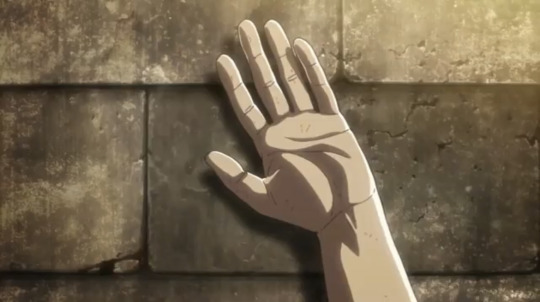
The choice between Armin and Erwin has long since been a topic of debate amongst AOT fans. Whether it was the right choice, how happy or unhappy it made viewers, why exactly the choice was made, and so on and so forth. I’ve always found it to be a very simple yet effective piece of storytelling—one that walks a very fine line of displaying a core story theme and honoring the characters involved.
Interestingly, Levi, who’s historically a follower and not a leader, is the one to make this very important narrative choice. It was carefully designed, too—everything he’s witnessed so far in this season has led to this moment, and this very important decision he’ll make.
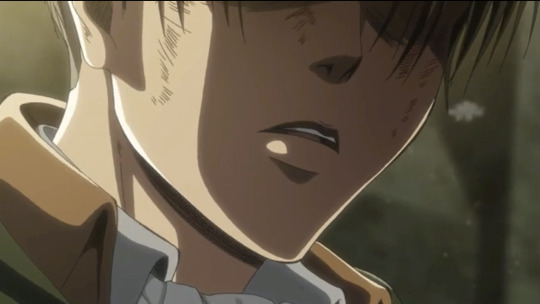
Now of course, as with everything, there’s a Watsonian and a Doylist reason for this decision to bring Armin back and not Erwin. Levi’s role in the choice is primarily a Watsonian one—he was one of the closest characters to Erwin, and he was the one to see Erwin struggle in his last moments before the charge.
Levi outright tells us his thought process after he makes the choice. After Erwin had let go of his dream, his struggle, which was as much a burden to him as a drive to continue forward, Levi thought it cruel to being him back into the world just because humanity needed a devil. It’s a human decision, and Levi made it for someone he cared deeply for.
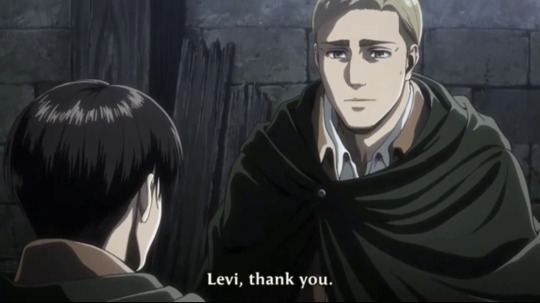
But from a Doylist perspective, there’s a thematic reason as to why Armin was chosen and not Erwin. Obviously Levi, as a character in the story, is not thinking of what Erwin’s and Armin’s respective dreams are narratively representative of. Levi, in making his choice, didn’t so much as pick Armin as he didn’t pick Erwin. He was letting Erwin go, and he wasn’t thinking about what that would do to the story.
But I am!
Levi has been witness to both Erwin’s and Armin’s dreams, and he’s smart enough to place those dreams within the context of the war they’re fighting.
He asked Erwin explicitly what he would do when his dream was fulfilled—once they got to the basement in Shiganshina and learned the truth of the world. Erwin said he didn’t know.
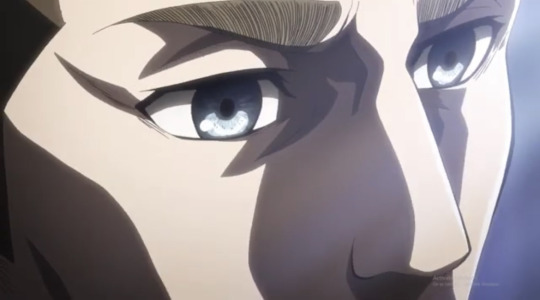
Conversely, when Armin talked with his friends about after the war, he spoke of the sea. Of exploration beyond the walls, of seeing the wonders he’d only been able to read about. Unlike Erwin, he knew exactly what he would do when the fighting ended.
Now, does this mean to imply Erwin would’ve been useless after reaching the basement? Of course not. Had he survived, he would have continued to lead. But thematically, his purpose in the narrative was to drive the fight forward at any cost. We see this over and over—from the first expedition outside Wall Rose to his last charge against the Beast Titan. That’s what he represents, and that’s what his dream led to.
Armin’s dream, though, extends beyond the fight. He only cares about winning the war in that it will allow him the chance to explore and experience the wonders of the world.
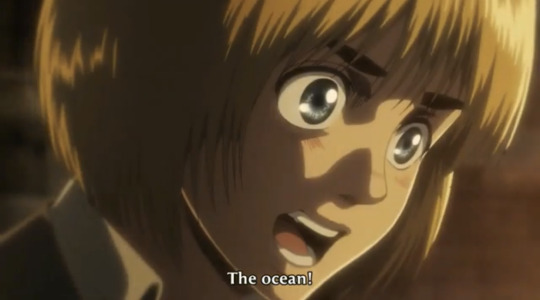
Choosing Armin over Erwin, thematically, represents AOT’s fundamental view on war and fighting. The drive to win is not nearly as important as hope for the future. For after the fight is over.
Armin has always found solace and hope in things other than the war that has defined his and his friends’ lives. He dreams of the ocean. He worships his friends. He lives, as he tells Zeke in the final final final season, for the small moments with them. “Maybe I was born to race Eren and Mikasa up that hill.” That would be enough for him, even without his grand dream of the sea.
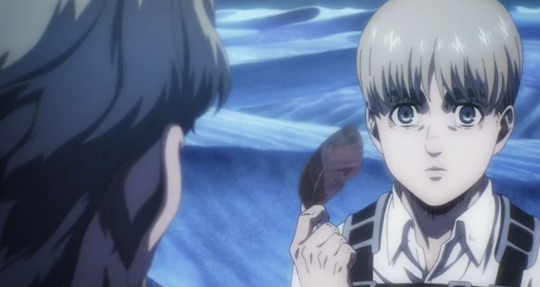
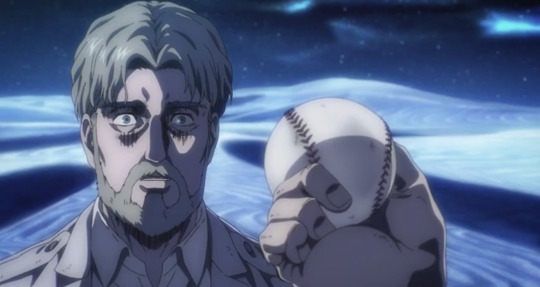
I genuinely think this choice is the closest thing AOT has to a thesis statement. This story shows us a plethora of messy situations to which there is no clear-cut solution. It displays a huge range of perspectives and philosophies without telling us what is good and what is bad. (Although it does, very specifically, tell us that genocide is bad, Eren!)
This choice in Midnight Sun, though, is more than a choice between two characters for survival. It speaks to what is most valuable in a world that seems to always be trying to kill you.
What good is winning the war if you don’t have something to hope for beyond that?
In other words, there’s some good in this world, Mr. Frodo. And it’s worth fighting for.
#attack on titan#shingeki no kyojin#armin arlert#erwin smith#aot#snk#mymeta#kylerrambles#midnight sun my beloved#and i could write a whole other essay on levi’s specific and messy relationship with erwin#but this was the particular thing gnawing on my shoe currently#i think this is somewhat echoed in eren’s final choice#what good is the outside world if you’ve trampled it all? you have to look beyond that!#not to mention this theme is communicated without vilifying either erwin or armin#something which fandom has never been able to do when discussing this particular story beat :P#erwin gets a very dignified though tragic death#and the only one who hates armin surviving (besides floch who is. the worst.) is HIMSELF#take notes fandom!#and it’s explicitly echoed in levi’s final monologue in the final season#he does not regret choosing the kid with that bright spark in his eyes#because as well as erwin fit into the cruel world of aot he needed to be released from it#armin will make the cruel world listen. he will make it BETTER.
22 notes
·
View notes
Text
i am as intrigued by memory loss laudna as the next person but i am honestly way more interested in laudna reckoning with the fact that she can now live for herself now, if delilah is gone.
laudna’s life is split into two: before her death and after her death. laudna even says that whitestone “felt like a different life”, that the events that took place didn’t feel like it happened to her, it felt like someone else (which is a whole other bag of worms into coping and trauma response and mechanisms of defense - but, for another time). the only time that line is blurred is with delilah and laudna’s own view of herself. laudna thinks she’s just a puppet, a vessel for delilah to take over at any moment. no part of herself is in her control fully, because the woman who killed her is living inside of her, leeching from her. after the “you were never alive” fiasco, laudna wonders if there was always some part of her that was just meant to be a puppet for someone else, even before her death. laudna’s wrecked sense of self because of delilah’s direct influence and manipulation makes her believe she is barely a person. she has no agency, no future, and no way out. and, at the crux of it all, because she is only sort-of living and not really herself, she makes her purpose to give herself entirely to someone else. laudna is not living for herself, because what is there to live for?
so i would truly truly love for her to go through a path where she realizes she is truly alive, where she has agency, and where she now has to deal with the fact that she can start living for herself. that she has a whole family who loves her. that she has to learn how to reconcile her past with a future that is now available to her. i want to see her deal with trauma she felt she could never escape but now she can. i want to see her heal and grow and learn how to live for herself.
#tldr: the power of memory is strong#btw this isn’t to say like. this is going to happen. just a response to fan theories that i actually also enjoy#i love me a good angst moment. but not necessarily feeling like i would like to see it in canon#laudna#critical role#cr spoilers#cr3#cr speculation#cr meta#flower talks#also. it’s a separate issue but memory loss fics/fan stuff and headcanons are always fishy to me in that sense where#it never focuses on the person whose memory is being affected? and then the entire plot becomes focused on the past memories instead of the#character itself or the future of the characters#anyways. sorry for the tangent. but laudna!!!! i love her so much!
315 notes
·
View notes
Text
Very interesting to me that a certain subset of the BES fandom's favourite iterations of Mizu and Akemi are seemingly rooted in the facades they have projected towards the world, and are not accurate representations of their true selves.
And I see this is especially the case with Mizu, where fanon likes to paint her as this dominant, hyper-masculine, smirking Cool GuyTM who's going to give you her strap. And this idea of Mizu is often based on the image of her wearing her glasses, and optionally, with her cloak and big, wide-brimmed kasa.
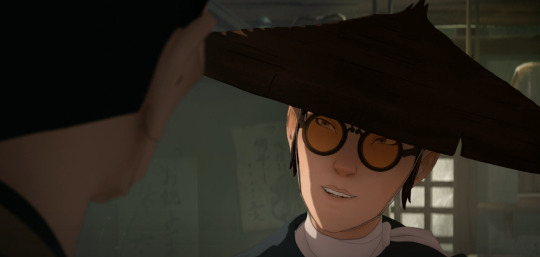

And what's interesting about this, to me, is that fanon is seemingly falling for her deliberate disguise. Because the glasses (with the optional combination of cloak and hat) represent Mizu's suppression of her true self. She is playing a role.

Take this scene of Mizu in the brothel in Episode 4 for example. Here, not only is Mizu wearing her glasses to symbolise the mask she is wearing, but she is purposely acting like some suave and cocky gentleman, intimidating, calm, in control. Her voice is even deeper than usual, like what we hear in her first scene while facing off with Hachiman the Flesh-Trader in Episode 1.
This act that Mizu puts on is an embodiment of masculine showboating, which is highly effective against weak and insecure men like Hachi, but also against women like those who tried to seduce her at the Shindo House.
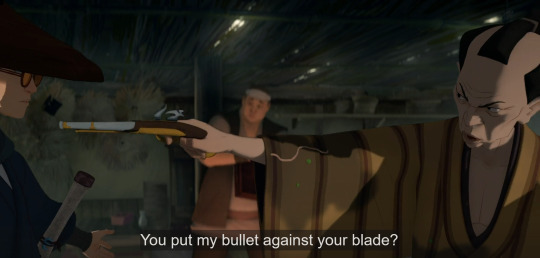

And that brings me to how Mizu's mask is actually a direct parallel to Akemi's mask in this very same scene.
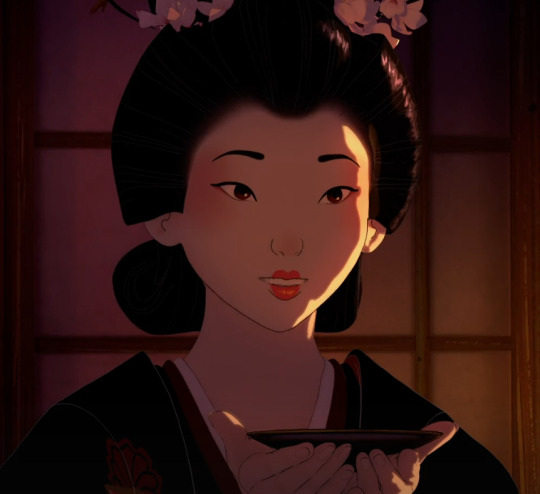
Here, Akemi is also putting up an act, playing up her naivety and demure girlishness, using her high-pitched lilted voice, complimenting Mizu and trying to make small talk, all so she can seduce and lure Mizu in to drink the drugged cup of sake.
So what I find so interesting and funny about this scene, characters within it, and the subsequent fandom interpretations of both, is that everyone seems to literally be falling for the mask that Mizu and Akemi are putting up to conceal their identities, guard themselves from the world, and get what they want.
It's also a little frustrating because the fanon seems to twist what actually makes Mizu and Akemi's dynamic so interesting by flattening it completely. Because both here and throughout the story, Mizu and Akemi's entire relationship and treatment of each other is solely built off of masks, assumptions, and misconceptions.
Akemi believes Mizu is a selfish, cocky male samurai who destroyed her ex-fiance's career and life, and who abandoned her to let her get dragged away by her father's guards and forcibly married off to a man she didn't know. on the other hand, Mizu believes Akemi is bratty, naive princess who constantly needs saving and who can't make her own decisions.
These misconceptions are even evident in the framing of their first impressions of each other, both of which unfold in these slow-motion POV shots.
Mizu's first impression of Akemi is that of a beautiful, untouchable princess in a cage. Swirling string music in the background.
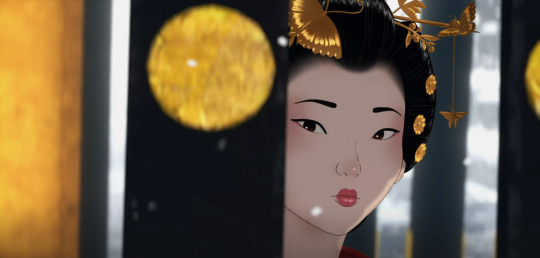
Akemi's first impression of Mizu is of a mysterious, stoic "demon" samurai who stole her fiance's scarf. Tense music and the sound of ocean waves in the background.

And then, going back to that scene of them together in Episode 4, both Mizu and Akemi continue to fool each other and hold these assumptions of each other, and they both feed into it, as both are purposely acting within the suppressive roles society binds them to in order to achieve their goals within the means they are allowed (Akemi playing the part of a subservient woman; Mizu playing the part of a dominant man).
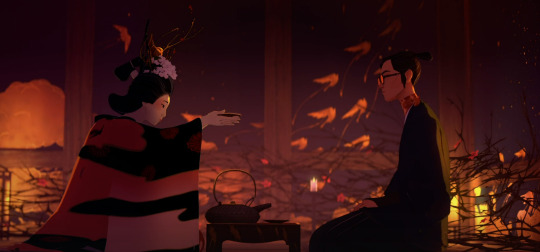
But then, for once in both their lives, neither of their usual tactics work.
Akemi is trying to use flattery and seduction on Mizu, but Mizu sees right through it, knowing that Akemi is just trying to manipulate and harm her. Rather than give in to Akemi's tactics, Mizu plays with Akemi's emotions by alluding to Taigen's death, before pinning her down, and then when she starts crying, Mizu just rolls her eyes and tells her to shut up.
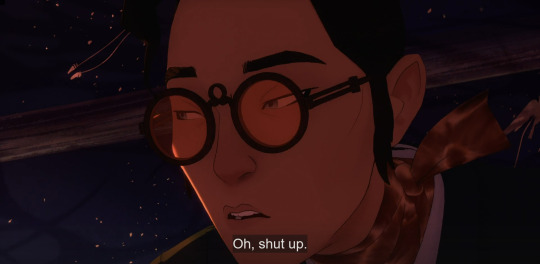
On the opposite end, when Mizu tries to use brute force and intimidation, Akemi also sees right through it, not falling for it, and instead says this:
"Under your mask, you're not the killer you pretend to be."
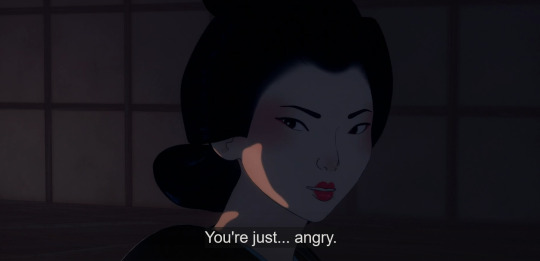
Nonetheless, despite the fact that they see a little bit through each other's masks, they both still hold their presumptions of each other until the very end of the season, with Akemi seeing Mizu as an obnoxious samurai swooping in to save the day, and Mizu seeing Akemi as a damsel in distress.
And what I find a bit irksome is that the fandom also resorts to flattening them to these tropes as well.
Because Mizu is not some cool, smooth-talking samurai with a big dick sword as Akemi (and the fandom) might believe. All of that is the facade she puts up and nothing more. In reality, Mizu is an angry, confused and lonely child, and a masterful artist, who is struggling against her own self-hatred. Master Eiji, her father figure who knows her best, knows this.
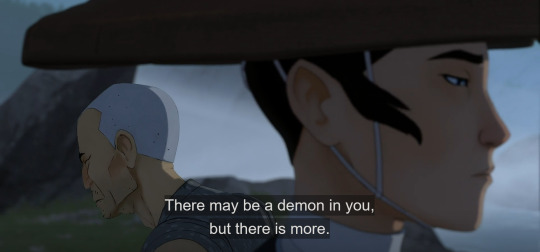
And Akemi, on the other hand, is not some girly, sweet, vain and spoiled princess as Mizu might believe. Instead she has never cared for frivolous things like fashion, love or looks, instead favouring poetry and strategy games instead, and has always only cared about her own independence. Seki, her father figure who knows her best, knows this.
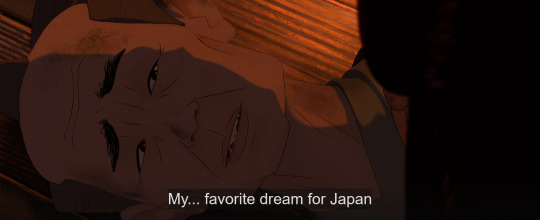

But neither is she some authoritative dominatrix, though this is part of her new persona that she is trying to project to get what she wants. Because while Akemi is willful, outspoken, intelligent and authoritative, she can still be naive! She is still often unsure and needs to have her hand held through things, as she is still learning and growing into her full potential. Her new parental/guardian figure, Madame Kaji, knows this as well.
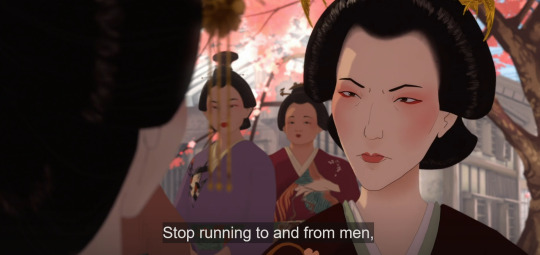
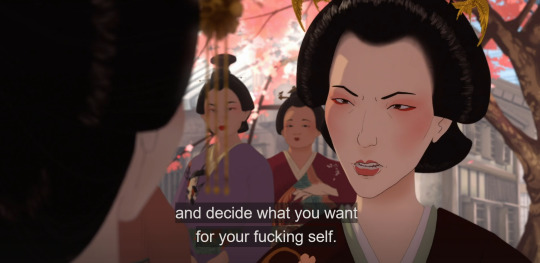
So with all that being said, now that we know that Mizu and Akemi are essentially wearing masks and putting up fronts throughout the show, what would a representation of Mizu's and Akemi's true selves actually look like? Easy. It's in their hair.
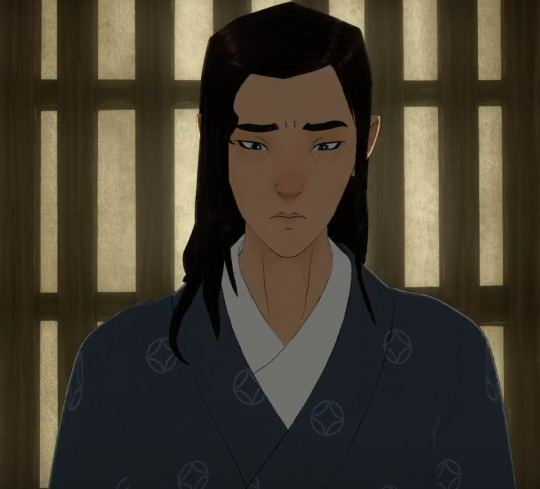

This shot on the left is the only time we see Mizu with her hair completely down. In this scene, she's being berated by Mama, and her guard is completely down, she has no weapon, and is no longer wearing any mask, as this is after she showed Mikio "all of herself" and tried to take off the mask of a subservient housewife. Thus, here, she is sad, vulnerable, and feeling small (emphasised further by the framing of the scene). This is a perfect encapsulation of what Mizu is on the inside, underneath all the layers of revenge-obsession and the walls she's put around herself.
In contrast, the only time we Akemi with her hair fully down, she is completely alone in the bath, and this scene takes place after being scorned by her father and left weeping at his feet. But despite all that, Akemi is headstrong, determined, taking the reigns of her life as she makes the choice to run away, but even that choice is reflective of her youthful naivety. She even gets scolded by Seki shortly after this in the next scene, because though she wants to be independent, she still hasn't completely learned to be. Not yet. Regardless, her decisiveness and moment of self-empowerment is emphasised by the framing of the scene, where her face takes up the majority of the shot, and she stares seriously into the middle distance.
To conclude, I wish popular fanon would stop mischaracterising these two, and flattening them into tropes and stereotypes (ie. masculine badass swordsman Mizu and feminine alluring queen but also girly swooning damsel Akemi), all of which just seems... reductive. It also irks me when Akemi is merely upheld as a love interest and romantic device for Mizu and nothing more, when she is literally Mizu's narrative foil (takes far more narrative precedence over romantic interest) and the deuteragonist of this show. She is her own person. That is literally the theme of her entire character and arc.
#blue eye samurai#mizu blue eye samurai#akemi blue eye samurai#blue eye samurai meta#just in case... im gonna tag this as#mizukemicritical#akemizucritical#though this post isnt actually criticising the ship itself but rather fanon's portrayal of the ship and the characters#for that reason lemme also tag this as#wank.mp3#feel free to disagree of course but please be civil#and if you need to rant about how wrong i am without any convincing evidence kindly feel free to make your own post. peace and love <3#fandom.rtf#meta dissertations.pdf#shut up haydar#edit: for full disclosure. i do rather dislike this ship. but obviously it's fine for anyone to enjoy it. please do! have your fun!#it's just that as usual! popular fanon and fandom around a ship is what has completely deterred me from any sense of enjoyment of it#it's a shame too because i was very open and even eager for some mizu/akemi romance in the future#but out-of-character fanon + the rudeness of certain fans has definitely soured it for me#but that doesn't mean people can't enjoy it obviously! ship and let ship!!!#plus it has its appeal which i DO STILL see and enjoy!!!!#i would even go as far as to call them soulmates because their narratives and characters are LITERALLY intertwined!!!#but. yeah. my gradual distaste for this ship is indeed very unfortunate.
722 notes
·
View notes
Text
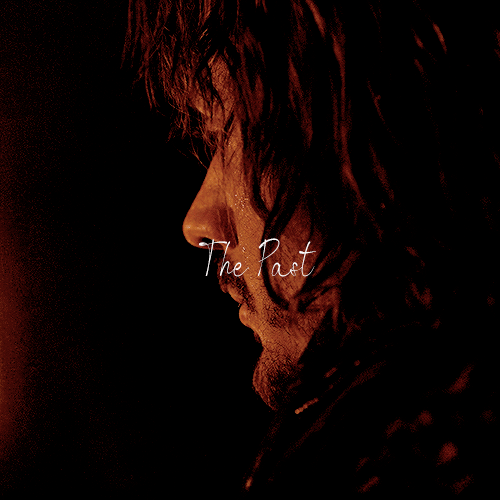
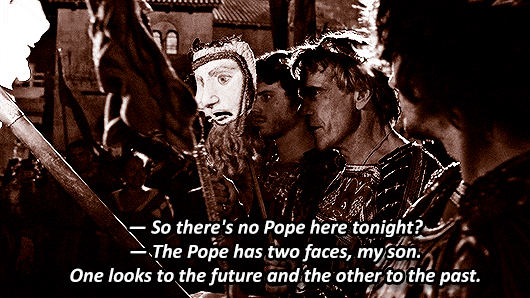
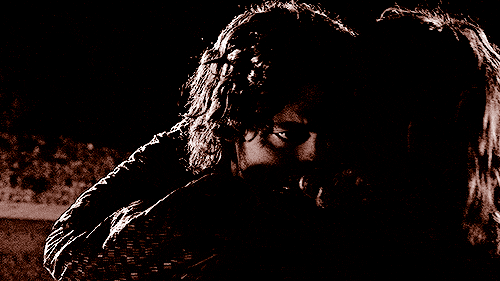
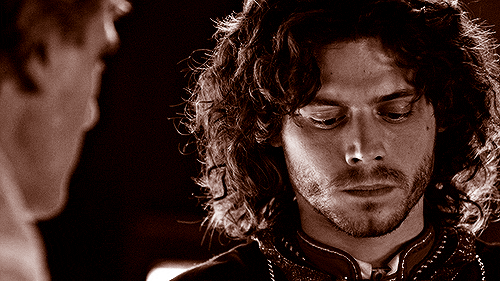
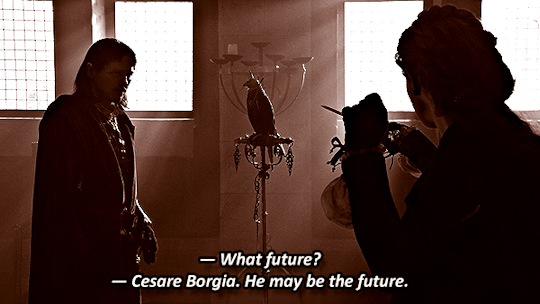

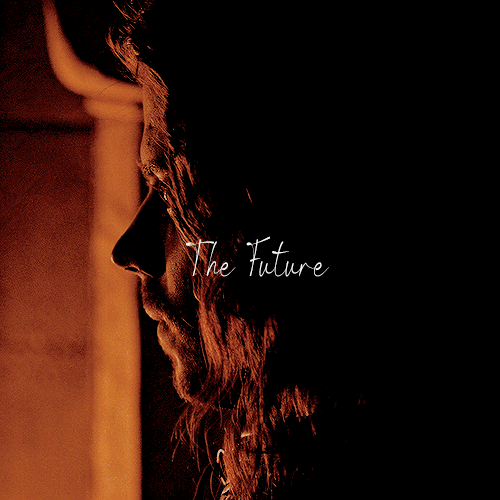
"There is that final embrace that I think helps with letting his brother go in a way. Juan has been the one who drove Cesare to become what he is now, and I think Cesare is building walls around his heart. You do get colder and less sentimental when you take that path. He has to go on and he can't mourn him forever, especially since he's responsible for his death. He's not making excuses for what he is anymore, and what he wants to be. He ultimately feels that it's the right thing for himself. It's something that he focused on and I think he can control his mind into having no second thoughts. And that's the only way you can rule in that era, really." — FRANÇOIS ARNAUD
#who up thinking about the tragic doomed brothers who are pawns in their father's game of ambitions?#juan is a great example of an impactful deceased character in media bc his death/aftermath shaped the rest of cesare's story until the end#like he was the one who drove his brother to finally become the cesare borgia he was meant to be and take the path he always wanted#the theme itself goes too hard as well like...foundational fratricide that led him to become the perfect prince™...well YES#the past shapes the destiny of the future it's why cesare/juan are forever linked. cesare decided juan's fate and juan formed cesare's path#also cesare ultimately doing it for //himself// is what makes him the most iconic main antagonist of all time#juan borgia#cesare borgia#the borgias#theborgiasedit#perioddramaedit#smallscreensource#tvgifs#filmtvtoday#cinemapix#tvarchive#juan and cesare#tvedit#dailyflicks#by jen
157 notes
·
View notes
Text
If frozen can get three movies and tangled is allowed a tv show and the first 8 princesses (sans Pocahontas) can get numerous remakes & spinoff media, then moana can get a sequel and PATF can get a show. Keep in mind tangled came out a year after PATF & completely overshadowed it & frozen is still popular compared to moana. So yes Tiana deserves her own show and theme ride Moana deserves a sequel and raya and wish deserve second chances.
#like if cinderella is allowed to a sequel (twist in time) to fix its flaws then raya and wish should get seqeuls to fix THEIRS#tiana and moana are allowed to continue their stories#like hell even PRINCESS JASMINE got to have more development in the aladdin tv show#and tangled the series even with my issues witu it gave rapunzel and flynn actual fucking character#*with !FUCK!#like ariel gets a show and sequel and remake#lets do the men: tarzan hercules they got their own show; buzz lightyear got his own show and movie; kuzco & baloo got shows#why is it suddenly an issue with tiana and moana (and the Madrigals) getting attention? what you wanna leave them in the gutter or somethin#HECK EVEN VARIAN WAS SUPPOSED TO GET HIS OWN SHOW#if cars was able to redeem itself with its third installment why cant raya and wish improve in future media too?#disney salt
20 notes
·
View notes
Text
Thinking about the Clive and Bill parallels again...
Both started with pretty average goals (gaining money / getting closure). Both became obsessed with said goals to the point of going through with their plans no matter the cost. Both became consumed by the desire to pursue a goal that isn't actually achievable (You can get more money but it will never feel like it's enough. You can lash out in anger but it won't make the anger go away). Both ended up killing innocents.
And yet.
Bill getting rid of his humanity in the hopes of getting money. Clive getting rid of his money in the hopes of getting his humanity back. Bill claiming he despises people like Clive when he has himself killed innocents for his own selfish plans. Clive claiming he hates politicians and scientists but still using science to build a mecha and politics to justify its use. Bill hiding everything, hiding from Claire that the machine isn't ready, hiding his crime from everyone. Clive exposing everything, exposing his secret base to Layton, exposing Bill and Dimitri's crime by his staging. Bill covering up the incident while Clive broadcasted his crime inside the fortress.
I don't know where I was going with this. Maybe that prime minister Bill looks like a honest citizen, just your regular Londoner really, while Clive is so obviously violent and destructive : and yet, Clive is the dove and Bill the hawk. Funny.
#In today's episode of 'Syl states the obvious' LOL#But yeah basically looks can be deceiving for them both I guess =)#This is once again a very simplified version. Hence why I don't go into too many details#Like Bill losing his humanity is the very moment he decided the risk was worth it. It's not even the explosion itself#Clive doesn't feel like a human because he's so alienated. He's ready to kill people. But he's hoping to get saved. Wrong actions ofc#It's actually so very important to me that Clive goes to jail but we aren't told a thing about Bill. Bill keeps everything a secret#Dimitri also has parallels with both. One day I'll write a good detailed analysis about these 3#clive dove#bill hawks#professor layton and the unwound future#professor layton and the lost future#unwound future spoilers#lost future spoilers#my analysis#This goes without saying but they're both assholes btw. Idc about the actual goals or characters they're both in the wrong and messed up
40 notes
·
View notes
Text
Womanhood as a prison in Natasha Pulley novels
I know that a great deal has already been said about Natasha Pulley’s portrayal of female characters, because even her most ardent fans (and I count myself among them) are often highly critical of how women are written in her stories - or, more aptly, written out of them.
But I think there is more to be said about how not only female characters are presented, but how the very concept of femininity is portrayed, via both the characters’ dialogue and inner thoughts. This analysis will reference all of Pulley’s books with the exception of The Bedlam Stacks. I’m excluding it on the grounds of it having little to no major female characters, but if any Bedlam superfans have any insight to add, please do reblog and contribute.
One of the main criticisms of Pulley’s women is their overarching similarity, so let’s briefly consider those commonalities. They are mostly educated, career-driven scientists (Grace is a budding physicist, Agatha a surgeon, Anna a much more experienced physicist). They are usually unnattractive by conventional standards; Grace is described as looking ‘like a boy’, Pepperharrow refers to herself as being ugly, Agatha is ‘tall and flat-chested’, and Anna’s introduction mentions that she has a ‘blonde buzz cut’ and is somewhat overweight.
They are also generally emotionally cold and poor caretakers, especially in contrast to the male characters. Joe’s wife, Alice, is noted to resent their daughter and engage with her far less than he does. Similarly, Shenkov is significantly more child-orientated than Anna. Agatha forces Missouri to watch a man having his throat cut, because she believes him too gentle for war. Said female characters may also show distaste for softer, more vulnerable women. Takiko Pepperharrow speaks of her mother like this (The Lost Future of Pepperharrow, p. 72):
Saying yes and simpering all the time was silly - her mother did that and even noticeably anxious ducklings walked over her mother
She isn’t the only person to speak of her mother with a degree of pity and distaste. Grace claims that to argue with her own mother feels like ‘slapping a kitten’ - Mrs Carrow is presented as too meek to understand her own powerlessness, to the point that she considers it an achievement to leave the house alone. In the epilogue of The Half Life of Valery K, Valery himself describes the pitiable housewife Cecilia as being ‘just as stunted as his own mother’. Similarly to Mrs Carrow, the aforementioned Cecilia is not presented as fully aware of how small and restricted her life is - her happiness rests on the outcome of a dinner party, nothing larger than that.
The common thread between these pitiable characters is that they embody traditional womanhood - they are married, they are subservient to their husbands, and they have children. Perhaps the most notable - and interesting - trend amongst Pulley’s female charcters is that they invariably have a complicated relationship with marriage, caretaking, and/or childbearing.
Pulley’s novels frequently frame motherhood (along with other traditionally feminine pursuits and behaviours) as an obstacle to the female characters’ goals. In conversation with her mother, Grace talks about the prospect of marriage in the following way (The Watchmaker of Filigree Street, p. 102):
“Wives have duties. If I have children I’ll go insane for a year and a half - don’t look like that, you did, with James and with William, it was terrifying - and that will be a year and a half of weeping over nothing and a brain made of soup in which I can’t work. And then it will happen again with the next child, and then slowly I won’t want to work at all, and I’ll always be soup...”
In Grace’s mind, having children is a barrier to her academic pursuits. She is fiercely certain that giving birth will not only reduce her brain to ‘soup’, but that the impact will be permanent - she will lose herself to motherhood, and it will take away her drive and her intellect. Similar sentiments can be found among other female characters, such as when Takiko observes the following (The Lost Future of Pepperharrow, p. 175):
All her sisters had had children, and all she’d learned from it was that people with children turned inward. She didn’t see any of them anymore.
Once again, there is the sense that motherhood steals from women. It takes them away from themselves by turning them inward, and also from other people in that they lose contact with family members. The Half Life of Valery K foregrounds Anna’s perspective on motherhood (p. 137), which is probably the most extreme of all:
..she had told him straight up when they got married that she wasn’t a natural mother, that she didn’t do well with small helpless things, because she had been trained to care about electron microscopes, thanks, and obviously she would gestate him a small helpless thing to look after if he wanted [...] but there would be no talk of staying home, nesting, or maternal fussing, because frankly that was nothing but weakness of character in a woman...
A significant part of this passage is the notion that Anna is not a natural mother because she has ‘been trained to care about electron microscopes’. Not only does this again put scientific pursuits and childrearing in opposition (you may care for one, not both), the verb ‘trained’ suggests that this behaviour is learned, as though she has been educated out of maternal desires.
At this point in the analysis, I would like to specify that discussing these ideas in fiction is not inherently problematic or anti-feminist. It is vitally important for women to be free to reject motherhood, and by extension it is good to see female characters who are unapologetically unmaternal and unfeminine. When I first read The Watchmaker of Filigree Street, I adored Grace’s character for this - I loved her arrogance, her stubbornness, her distaste for marriage, her coarseness. Even the fact that she looked down on other women made her fascinating to me, because we just don’t see a lot of multi-faceted female characters who act in this way. She was complex and interesting without being a Strong Female Character™ to look up to - she was allowed to be wrong and wildly dislikable.
Where I take issue, however, is the fact that we have never seen an alternative to Grace in all five of Natasha Pulley’s novels. She is yet to write a significant female character who is complex and important despite being more traditionally feminine - there are no women who are scientists and dedicated mothers, who are career-minded and gentle, who are fiercely independent and hopeless romantics. It is one thing for Grace and other characters to disparage the poor, oppressed housewives in their society, but it is another thing entirely for the narrative itself to disparage these women. A woman without an education is still a fully-realised person with her own internal life. Women who cannot attain much agency are still as complex as those who can, yet Pulley’s stories never quite acknowledge this.
Which leads me onto the overarching portrayal of womanhood in Pulley’s novels. I’ve always been hesitant to assume too much based on singular characters, as I do think it’s imporant to recognise that a character’s perspective is not a proxy for the author’s. But after five books, the patterns are undeniable, and I think they’re more marked in The Half Life of Valery K than they ever have been. Consider the quotation below, taken from p. 30:
[Valery] never knew what to say when women pointed out that they were women and that it was, generally, awful. There was a knee-jerk human instinct to say it couldn’t be as bad as all that, like he would have to anyone who was feeling blue, but it was one of those instances where it really was awful, and trying to say it wasn’t was somewhere on the spectrum between stupid and criminal.
Valery offers an invariably bleak perspective on womanhood, which is in keeping with the attitudes of the female characters in Pulley’s books. Not only is womanhood described as miserable - Valery also claims that to deny the truth of this is either ‘stupid or criminal’. There is no space to take a more positive view on femininity.
Being charitable, we could view this as a (heavy-handed) condemnation of sexism and patriarchy, and I do think that this is Pulley’s intention. But it’s worth considering that she does not discuss other marginalisation in this way. Despite the homophobia her numerous queer protagonists face, nobody goes on a similar tirade about the misery of being a man who loves other men. The trials and struggles are acknowledged, but queer love is still rightfully shown to be beautiful and privately joyous - in a way that being a woman never is.
Instead, womanhood in Pulley’s novels is oppressive and inescapable. Even a young girl’s fingernails cannot be neutral - they too represent the trappings of patriarchy (The Half Life of Valery K, p. 274):
“I can’t do it,” Tatiana said to her own laces. She studied her fingernails. “My tools of the patriarchy are getting too long.”
(This is an utterly bizarre thing for a little kid to say, by the way).
Towards the end of the novel, a carriage full of female prisoners is set upon by male ones, which is portrayed almost as an inevitablitity - we do not get a scene of exactly what happens, because the outcome is obvious enough to be implied. This outlook on the inevitability of violence against women is never challenged at any point; Valery only emphasises it in the final pages of the novel (p. 369):
every doctor he worked with and laughed with in tea breaks probably had an identical wife, all of them keeping women like bonsai trees
The messaging across Pulley’s novels is that of womanhood as a prison. There is little to no joy to be found in it; it results in confinement, loss of the self, isolation from others, and exposure to physical and emotional violence. Women who ‘succumb’ to marriage and children are given little voice in her stories - they are pitiable, ‘identical’ lost causes, called ‘stunted’, compared to kittens and bonsai trees. The only female POVs are that of women rebelling against conventional femininity, who are ambivalent or outwardly resentful towards caretaking, childrearing, and reliance on others. And even these women do not get to take up a great deal of space; all of them serve as obstacles to the central romances and all of them are written out to secure the male characters’ happily ever afters.
I do not believe that Natasha Pulley has malicious intent in how she writes female characters. It is important to address misogynistic violence and the ways in which the institution of marriage has restricted and oppressed women, and I believe she does try to do that. But there are ways to explore this issue whilst still acknowleding the variety of women’s experiences - and, crucially, showing that there is more to femininity than suffering.
But it requires time and space. Natasha Pulley has no hope of doing this if she does not start deviating from her usual archetypes - her stories need a better quality and quantity of women. While I live in hope of improvements to her female representation, I would be lying if I said I was optimistic.
#natasha pulley#the watchmaker of filigree street#the half life of valery k#the kingdoms#the lost future of pepperharrow#i wrote this instead of doing my actual job this afternoon#I just couldn't. stop. thinking about it#my friend finished reading the kingdoms yesterday and we ended up talking about the huge Weirdness of her female rep#and the more I looked back over valery k the more i think that book has such a STRANGE presentation of women and gender as a whole#the fact that it almost tries to pass itself off as feminist (in such a heavy handed way too!) while shafting the female characters is just#not good chief#long post
211 notes
·
View notes
Text
every time i see someone call tron 'cyberpunk', i lose ten years off my lifespan
#note to self literally never read letterboxd reviews of movies i like i cant do it anymore kdjfgkdssd#say you saw the movie and the plot and visuals went right over your head without saying it#like. in what world is tron dystopic?? cyberpunk in itself is an offshoot of dystopian fiction. tron is not about an imagined future#tron is about an imagined PRESENT. thinking about our PRESENT relationship with technology in relation to the times each film was released#tron is in equal measures hopeful and critical about technology. that is NOT cyberpunk#the only CyberPunk that matters in tron is the Tron2.0 character of the same name#i will admit that tron's plot is cyberpunk derived but its. idk man its not the same thing#thematically its different. visually i think tron shares developmental artists with blade runner where the cyberpunk visual stereotype was#- established#but blade runner is more pure cyberpunk thematically than tron is. does that make any sense#and. and. listen to me. i am number one retrofuture fan. i love syd mead. i love moebius. but listen. just because they worked on tron -#- does NOT mean tron is thematically OR visually retrofuturistic either!! the visuals match the time it was made!! thats not retrofuturism!#thats normal scifi based on the every day!!!#tron is a sandbox and at the end of the day anyone can do whatever they want its all just for fun#at the same time. the entire story of tron is being severely misrepresented when labelled as cyberpunk. and it makes me sad#these are very shallow thoughts i just miss literary thematic analysis sometimes. my film studies classes cannot come soon enough#rex speaks
36 notes
·
View notes
Text

The actual queen. Not right now. Eventually. Like chapter 35. But still.
Anyways fuck that blue skin, it looks fucking hideous
#miraculous ladybug#peahen#bluebell Rossi#peacocks#peacock#peacock miraculous#the history book on the shelf is always repeating itself#mlb future au#miraculous future au#oc#origional character
14 notes
·
View notes
Text
I think the biggest thing about Sunless Skies that gives it a different feel than Fallen London (other than the obvious gameplay differences) is the position of your player in the universe. In Flondon, your character is important and singular. The storyline is oriented around mastery and influence: starting from the bottom and climbing to the top, gaining recognition and reach as you unravel the world's secrets. While social play is encouraged, there are few in-game characters comparable to the PC, and in many plotlines the idea of being the only or the first one to accomplish a certain thing is specifically emphasized. The story is about what path you take to Make Your Name.
In Sskies, that goal is not absent, but there's a sense of...fleetingness, that never quite leaves you. There are many others like you. You see their entries in the cache logs, they are mentioned in the ports and pubs, you find their frozen bodies littering the open void like stones. It is the very first thing you know when you start: you are a Captain filling the shoes of a predecessor, and in all likelihood simply keeping them warm for the next to come after you, and the next. Your time is limited. Your significance to the wild, vast, ancient skies is negligible. The drive in the story comes from this: Your space in this universe is small and hard fought. Make it count.
#fallen london#sunless skies#i would say I like the sskies version better but honestly I think they both work great for their own applications#both in setting and for the way the games are played#I've seen the flondon fame gathering thing criticized occasionally but honestly I've always read it as like#a tongue in cheek parody on rich Victorian ego#as well as being inherently flexible,because of how players tend to treat the stories#for some it will be about doing Everything,but for most it's about getting a wide choice of what to focus on and how to specialize#in a character development sense#and also the story really is about How you get there and who you are while doing so#what with the quirks and everything#that's a mechanic that's notably absent from sskies#probably because your character is meant to be less permanent and less noticeable as an individual#most of the in-game character defining you do relates to building out their past with facets#because their present and future are so tentative and so embedded in the bigger picture#I really really like it. it's almost like the world is more the character#but ALSO the feel of like. the game does not treat loss lightly. there are Implications and narrative even for the loss of unnamed crew#it all also plays in so so nicely to the switch from flondon's tightly controlled sheltered chaos#(enclosed in a cave,tightly governed by the Bazaar,the sense of a new world building itself on top of older ones)#vs the Reach being so open and fraught and wild and legitimately teetering on the brink in every way#the way the characters are treated fits so so well into the political landscapes too#like. sskies is wartime.#the messaging that you the individual is fleeting and disposable and that it's what you donate your effort to that matters is Constant#so it works really really well there#oh now I want to go on again about how well the flondon way works in a meta sense for gameplay and community building#because it's emphasizing individuality while also paired so heavily with social actions and -#ouuuuuuuuuuuuuuuuuuu#hey gang have i mentioned. I like fallen london a lot. hey have i mentioned yet that I like flondon A Lot#voidrambles#<- It Sure Does
78 notes
·
View notes